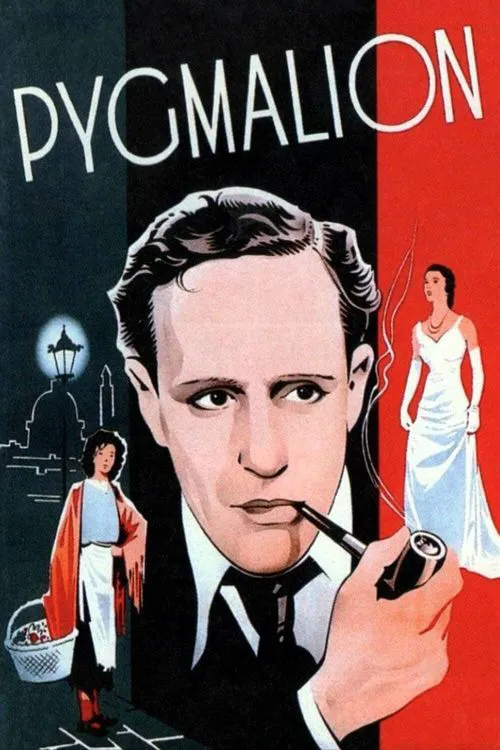Pygmalion

Plot
In the world of 1912 London, linguistics professor Henry Higgins is renowned for his exceptional skills in phonetics and his unyielding confidence in his abilities. Higgins, a self-proclaimed expert in transforming people's accents and speech patterns, boasts to his acquaintance Colonel George Pickering that he can pass off a common Cockney flower girl as a princess with only six months' worth of training. Pickering, intrigued by the prospect of this remarkable feat, decides to test Higgins's claim by making a wager with his friend. The bet is accepted, and soon a young flower girl named Eliza Doolittle catches Higgins's attention. With her distinct Cockney accent and rough demeanor, Eliza embodies the perfect subject for Higgins's experiment. After negotiating a deal with Eliza's dustman father, Alfred, Higgins convinces him to send his daughter to live with him for the duration of the experiment. As Eliza settles into her new life in Higgins's home, she meets her benefactor, Colonel Pickering, who is also staying in the house. Despite some initial hesitation, Eliza, a plucky and determined young woman, proves herself to be a quick learner, rapidly adapting to her new surroundings. Higgins commences Eliza's rigorous transformation, pushing her to adopt more refined speech patterns, etiquette, and posture. Eliza's training is not limited to her language skills; Higgins also seeks to instill a sense of elegance and sophistication within her. The professor's goal is not only to change Eliza's appearance but also to alter her very essence, transforming her into a sophisticated, upper-class woman. As the months pass, Eliza makes remarkable progress, her Cockney accent slowly giving way to a more refined, aristocratic tone. However, as Eliza undergoes this transformation, she is not the only one who is being changed. Higgins, a man accustomed to being around people with similar backgrounds and values, finds himself confronting the nuances of Eliza's working-class perspective. Despite his polished demeanor, Higgins is, in fact, a man with a deeply ingrained sense of social elitism. Through his interactions with Eliza, he is forced to confront the limitations and prejudices of his own world. As Eliza's transformation progresses, she begins to assert herself, questioning the rules and societal norms that Higgins has imposed upon her. She starts to develop her own sense of self-worth and independence, which occasionally puts her at odds with her rigid and controlling mentor. Higgins's relationship with Eliza is complex, to say the least. On one hand, he genuinely seems to care for her well-being and takes pride in her progress. On the other hand, he also sees Eliza as nothing more than a subject for his study, a means to an end, rather than a person with her own agency and desires. Colonel Pickering, who has been observing the situation with interest, serves as a gentle voice of reason, cautioning Higgins against his own arrogance and suggesting that he consider the human side of his experiment. Throughout the story, Pickering proves himself to be a true friend to Higgins, providing much-needed guidance and encouragement. As the six months draw to a close, the time comes for Higgins's grand finale – to present Eliza to the world as a transformed, upper-class lady. Higgins, Eliza, and Professor Pickering set off to a royal garden party, where they plan to test the limits of Higgins's claim. In the end, the success of the experiment is a resounding yes. Eliza seamlessly adapts to her new surroundings, effortlessly interacting with the aristocrats in attendance, and convincing even the most discerning observers of her newfound refinement. Higgins's bet is won, but at what cost?
Reviews
Recommendations




